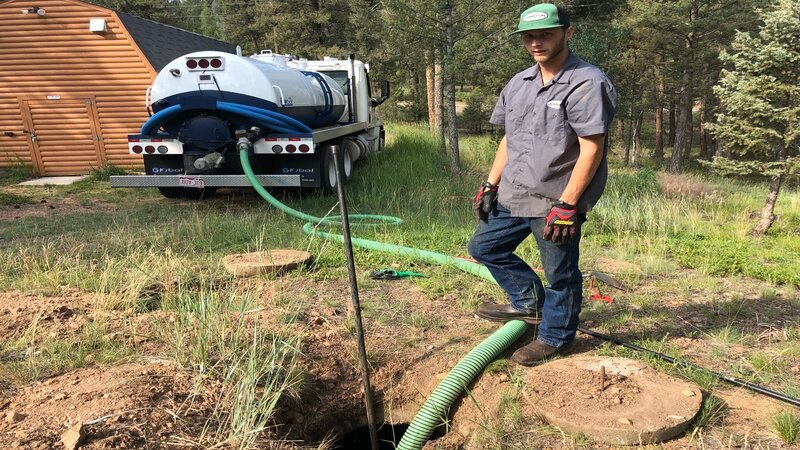
Septic FAQ
FAQ for Elkhart Septic – Common Questions about Septic Services
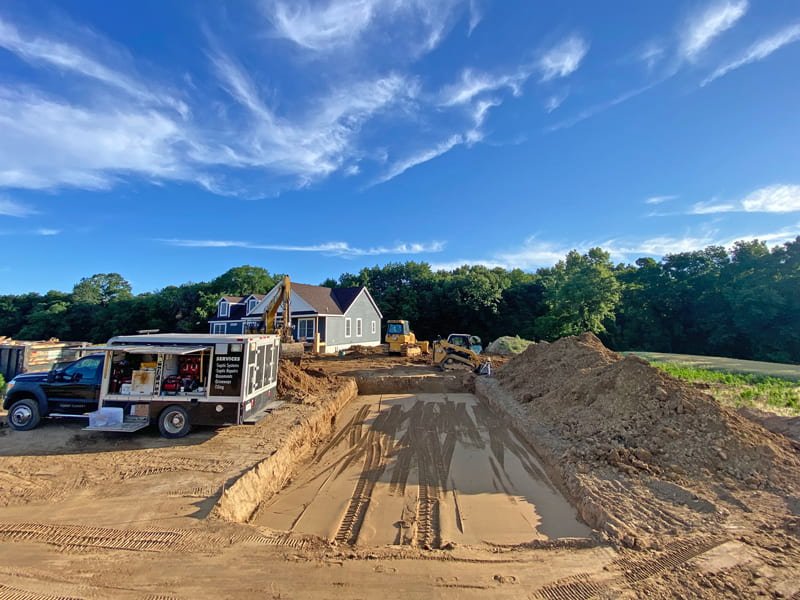
Q1: What defines a septic tank?
A septic tank is a subterranean wastewater treatment system widely utilized in areas lacking access to a centralized sewer system. It gathers, treats, and disposes of wastewater from residences and structures.
Q2: How does an Elkhart Septic tank operate?
An Elkhart Septic tank functions by segregating solid waste from wastewater. Solid particles settle at the tank’s base, forming sludge, while liquid effluent stays on top. Bacteria break down organic matter, and the effluent is discharged into a drain field for further treatment.
Q3: How frequently should I schedule Elkhart Septic tank pumping?
Elkhart Septic tanks should undergo pumping every 3-5 years, depending on tank size and home occupants. Regular pumping prevents solid buildup, ensuring optimal system functionality.
Q4: What signals potential Elkhart Septic tank issues?
Indications of Elkhart Septic tank problems encompass slow drains, gurgling sounds, unpleasant odors, sewage backups, and unusually damp areas in your yard. If any of these signs appear, promptly arrange for a septic system inspection and necessary repairs.
Q5: Can Elkhart Septic tank additives enhance performance?
Though numerous septic tank additives exist, their effectiveness is debated. Generally, a well-maintained Elkhart Septic system doesn’t require additives. Prioritize regular pumping, appropriate water usage, and abstaining from harsh chemicals for sustained system longevity.
Q6: Can I landscape or construct over my Elkhart Septic system?
Avoid planting large trees or constructing heavy structures over your Elkhart Septic system. Tree roots may damage pipes, while heavy structures can compact soil, impeding proper drainage. Consult professionals before making landscaping or construction decisions.
Q7: How do I uphold my Elkhart Septic system?
Effective Elkhart Septic system maintenance involves routine pumping, water conservation, refraining from flushing non-biodegradable items, using septic-safe cleaning products, and regular inspections. Adhering to these guidelines extends your septic system’s lifespan.
Q8: What steps should I take if my Elkhart Septic system malfunctions?
In the event of Elkhart Septic system failure, promptly engage professional septic services. They’ll assess the issue, execute necessary repairs or replacements, and ensure your system functions optimally to mitigate health and environmental risks.
Q9: Any precautions to safeguard my Elkhart Septic system?
Protect your Elkhart Septic system by refraining from flushing items like diapers, wipes, cigarette butts, grease, oil, feminine hygiene products, and excessive chemicals. Also, monitor water usage and stagger laundry and dishwasher loads throughout the week.
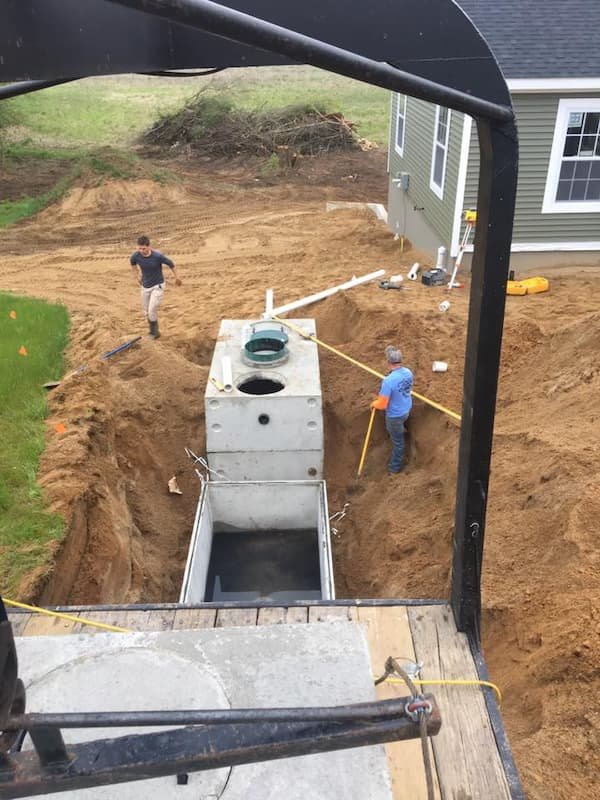
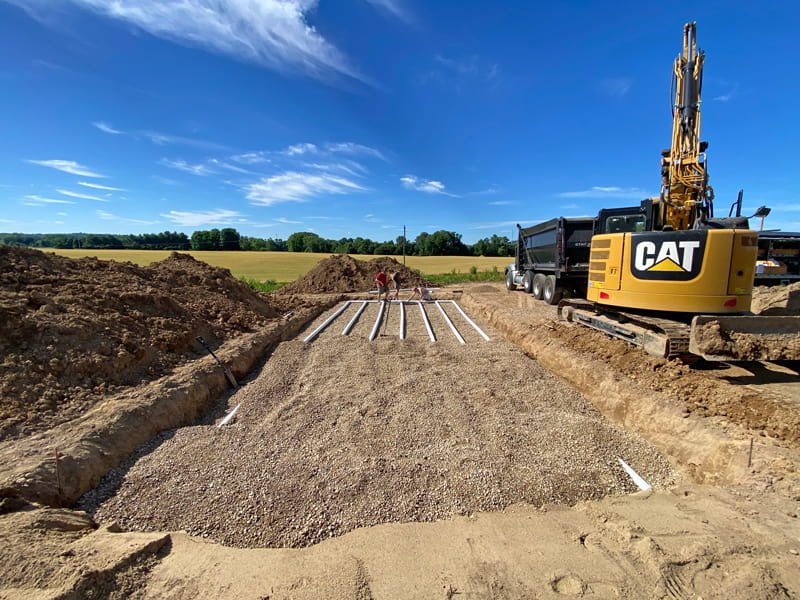
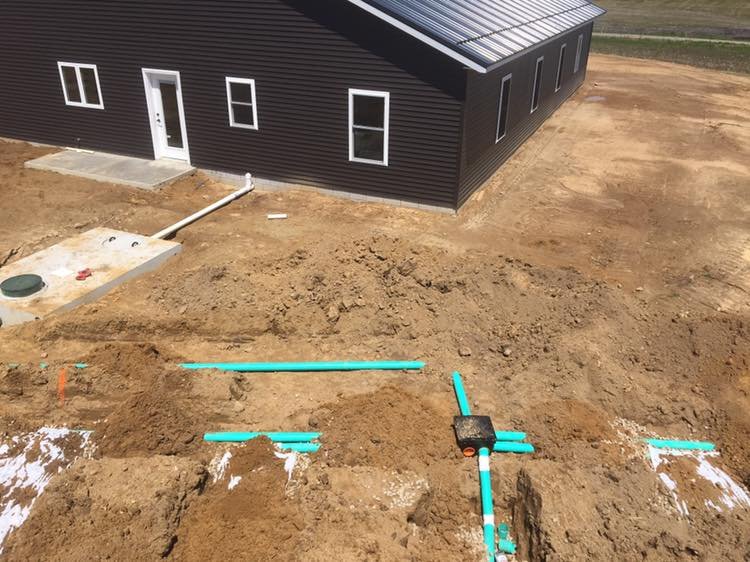
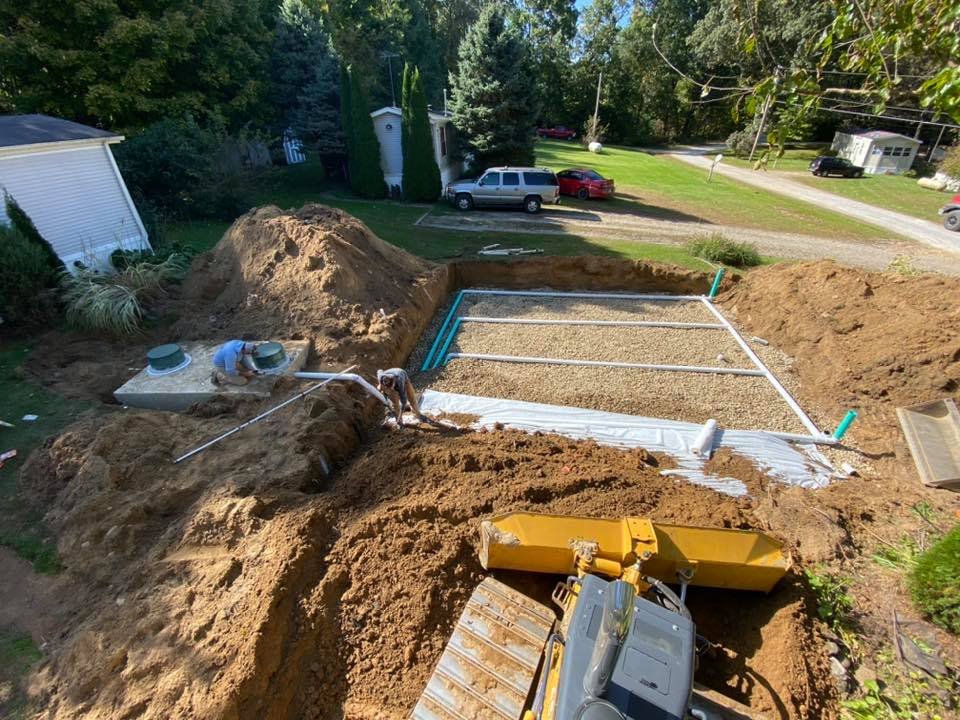
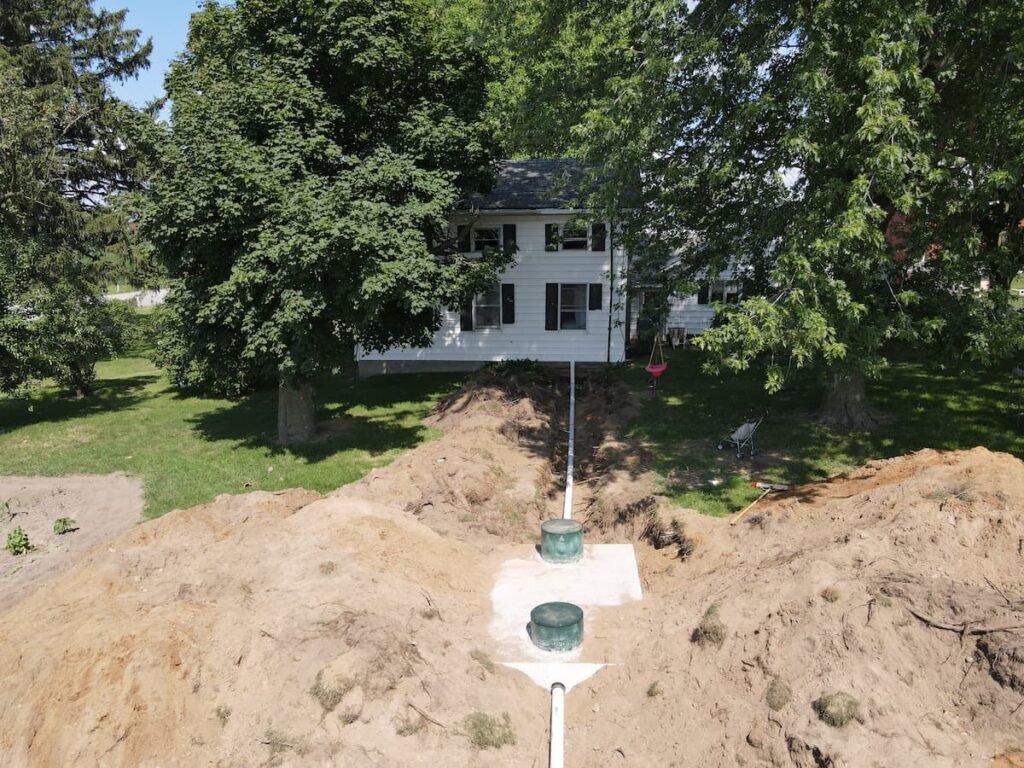
Elkhart Septic provides essential wastewater treatment solutions for areas without access to centralized sewer systems. Operating underground, these systems efficiently collect, treat, and dispose of wastewater from both residential and commercial structures.
The functionality of an Elkhart Septic tank hinges on its ability to separate solid waste from wastewater. Solid particles settle at the tank’s base, forming sludge, while liquid effluent remains on top. Bacteria within the tank break down organic matter, and the treated effluent is then discharged into a drain field for further processing.
Regular pumping is a key aspect of Elkhart Septic tank maintenance, recommended every 3-5 years. The frequency depends on factors like tank size and the number of occupants in a home. This preventive measure is crucial to prevent the accumulation of solids, ensuring the system operates at peak efficiency.
Recognizing signs of potential issues is vital for Elkhart Septic system owners. Slow drains, gurgling sounds, unpleasant odors, sewage backups, and unusually damp areas in the yard are indicators that prompt inspection and timely repairs to maintain system health.
The question of using additives to enhance Elkhart Septic system performance is often debated. Generally, a well-maintained system does not require additives. Prioritizing regular pumping, responsible water usage, and avoiding harsh chemicals contribute more significantly to the long-term functionality of the system.
Landscaping decisions around Elkhart Septic systems require caution. Planting large trees or constructing heavy structures over these systems can have adverse effects. Tree roots may invade and damage pipes, while heavy structures may compact the soil, hindering proper drainage. It’s advisable to consult professionals before making any landscaping or construction choices.
Effective Elkhart Septic system maintenance involves more than just pumping. Water conservation, refraining from flushing non-biodegradable items, using septic-safe cleaning products, and regular inspections contribute to the overall well-being of the system.
In the event of Elkhart Septic system failure, prompt action is crucial. Engaging professional septic services ensures a thorough assessment of the issue, necessary repairs or replacements, and the restoration of optimal system functionality to prevent potential health and environmental risks.
To safeguard your Elkhart Septic system, adopt prudent practices such as refraining from flushing items like diapers, wipes, cigarette butts, grease, oil, feminine hygiene products, and excessive chemicals. Additionally, monitor water usage and stagger laundry and dishwasher loads throughout the week for optimal system longevity.Elkhart Septic stands as a cornerstone in providing wastewater treatment solutions to the diverse landscapes of homes and businesses that lack access to centralized sewer systems. Beneath the surface, these systems quietly play a crucial role in collecting, treating, and responsibly disposing of wastewater, ensuring environmental sustainability and public health.
Delving deeper into the mechanics, Elkhart Septic tanks operate by intricately separating solid waste from wastewater. Through a natural process, solid particles settle at the tank’s bottom, forming a layer of sludge, while the liquid effluent remains buoyant on top. The introduction of beneficial bacteria aids in breaking down organic matter, allowing the treated effluent to be discharged into a drain field for additional processing, contributing to the overall ecological balance.
The significance of regular pumping cannot be overstated in maintaining the health of Elkhart Septic systems. Recommended every 3-5 years, this preventative measure is tailored to the specific needs of each system, considering factors like tank size and household occupancy. By preventing the build-up of solids, Elkhart Septic ensures the continued efficiency and longevity of the system.
Vigilance is paramount when it comes to recognizing signs of potential issues with Elkhart Septic systems. Slow drains, unusual sounds, unpleasant odors, backups, and changes in the landscape can serve as early warnings. Prompt action, including inspection and timely repairs, is crucial to safeguard the system from more severe damage.
The debate surrounding the use of additives to enhance Elkhart Septic system performance underscores the importance of fundamental maintenance practices. While additives exist in the market, prioritizing routine pumping, responsible water usage, and the avoidance of harsh chemicals remains central to sustaining system health over the long term.
Landscaping decisions around Elkhart Septic systems require thoughtful consideration. Planting large trees or constructing heavy structures above these systems demands caution due to the potential risks. Professional consultation is advised to navigate these choices, ensuring the system’s integrity and preventing avoidable damage.
Elkhart Septic system maintenance goes beyond periodic pumping. Water conservation practices, responsible waste disposal, and the use of septic-safe cleaning products contribute collectively to the longevity of the system, promoting sustainable wastewater management.
In the event of a system failure, Elkhart Septic emphasizes the importance of swift professional intervention. Expert septic services conduct comprehensive assessments, implement necessary repairs or replacements, and restore the system to optimal functionality, mitigating potential health and environmental risks.
To safeguard the integrity of your Elkhart Septic system, adhere to prudent practices such as avoiding the flushing of non-biodegradable items, monitoring water usage, and distributing household tasks like laundry and dishwashing strategically throughout the week. These practices form a proactive approach to system care, ensuring its continued effectiveness for years to come.Elkhart Septic’s role in managing wastewater is integral to maintaining the well-being of communities where centralized sewer systems are not an option. These underground systems operate discreetly, diligently collecting and treating wastewater from both residential and commercial sources. By doing so, Elkhart Septic not only ensures the preservation of environmental health but also contributes significantly to the overall sustainability of local ecosystems.
Digging into the mechanics of Elkhart Septic tanks reveals a sophisticated process. Solid waste is methodically separated from wastewater, with solids settling at the tank’s base to form sludge. Meanwhile, liquid effluent rises to the top. This intricate separation, coupled with the action of beneficial bacteria, results in the breakdown of organic matter. The treated effluent is then released into a drain field for further processing, marking a critical step in the responsible management of wastewater.
The emphasis on regular pumping is a testament to Elkhart Septic’s commitment to system longevity. Tailored to each system’s unique needs, this preventive measure, recommended every 3-5 years, prevents the accumulation of solids. By maintaining an efficient balance, Elkhart Septic ensures that the system continues to operate at peak performance, minimizing the risk of potential issues.
Vigilance is key when it comes to the signs of potential problems in Elkhart Septic systems. From slow drains and unusual sounds to unpleasant odors and changes in the landscape, early detection allows for prompt action. Timely inspection and repairs are essential to prevent minor issues from escalating and safeguard the integrity of the system.
The discourse around additives for system enhancement underscores the importance of fundamental maintenance practices. While various additives exist, Elkhart Septic emphasizes the foundational elements of routine pumping, responsible water usage, and the avoidance of harsh chemicals. These practices, rooted in sustainability, form the backbone of effective system management.
Landscaping decisions involving Elkhart Septic systems necessitate a thoughtful approach. The potential risks associated with planting large trees or constructing heavy structures above these systems highlight the need for professional guidance. Consulting experts ensures that landscaping choices align with the system’s integrity, preventing avoidable damage and ensuring its continued effectiveness.
Elkhart Septic’s vision of comprehensive system maintenance extends beyond routine pumping. Water conservation practices, responsible waste disposal, and the use of septic-safe cleaning products collectively contribute to the system’s longevity. This holistic approach underscores Elkhart Septic’s commitment to sustainable wastewater management.
In the event of a system failure, Elkhart Septic advocates for swift professional intervention. Expert septic services conduct thorough assessments, implement necessary repairs or replacements, and restore the system to optimal functionality. This proactive approach mitigates potential health and environmental risks, embodying Elkhart Septic’s dedication to community well-being.
To safeguard the integrity of your Elkhart Septic system, adopting prudent practices, such as avoiding the flushing of non-biodegradable items and strategic management of water usage, remains crucial. These practices, when woven into the fabric of daily life, contribute to the sustained effectiveness of Elkhart Septic systems, ensuring they continue to serve communities for years to come.
